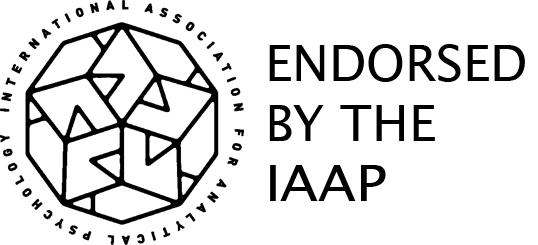Date
- Jul 17 - 21 2023
- Expired!
Time
UTC-5- 12:00 pm - 3:30 pm
Local Time
- Timezone: America/New_York
- Date: Jul 17 - 21 2023
- Time: 1:00 pm - 4:30 pm
Cost
- $90.00
Speakers
 Susan Schwartz
Susan SchwartzSusan E. Schwartz, Ph.D., Jungian analyst and clinical psychologist, presented workshops and lectures in numerous countries. Susan has published articles in several journals and contributed chapters to books on Jung’s analytical psychology. Her book, published by Routledge in 2020, is entitled: The Absent Father Effect on Daughters, Father Desire, Father Wounds.
- Julie Bondanza
- Robert Tyminski
- Sylvester Wojtkowski
Location
Organiser

C. G. Jung Foundation for Analytical Psychology
Website
https://jungian.directory/related_organisation/c-g-jung-foundation-for-analytical-psychology/Summer Study Online Program 2: Identity, Alienation and Exile
This week begins with an examination of the “As-if” personality, also referred to as Imposter Syndrome, and a discussion of its regenerative nature. The next session centers on the relationship of Jung’s work in the Red Book and Black Books and the poetry of Fernando Pessoa, exploring the question: “Who is the I, that I claim I am?” Mid-week we explore the colors and moods of exile energy as it manifests in our personal lives and in the collective and as it shows up in the consulting room. Our fourth session will focus on the psychological implications of immigrating to a new place, intergenerational trauma and the role of the uncanny in these experiences. We will end the program with a discussion of the alienating effect of trauma on the ego.
Welcome and Orientation: Monday, July 17 | 11:30 am – 12 noon
Who am I Really? The ‘As-If’ Personality and Imposter Syndrome
This seminar explores the fragility of self in the ‘As-If’ Personality, the popularly termed imposter syndrome. This person lives on illusions and is both the mirror and the mask, presenting in artifice. Known for a slickly contrived persona/ego image, behind it the ‘as-if’ person withdraws into fantasy. Inside is alienation and self-isolation, loneliness. The issues affect intimacy with oneself and others due to the difficulty being present. The areas include not belonging, sexual addiction, aging, the cultural influence of social media, the role of the father and mother, body image and split selves. All these are promoted by the culture of social media where reality and illusion are often blurred.
The complex aspects are explored through composite clinical examples, dreams and a fairytale as we seek to ground this elusive personality type. The purpose of exploring the ‘as-if’ and imposter personality is to find what can be replenishing and regenerative to the person and culture
Instructor: Susan E. Schwartz, PhD
 An I and Self-Othering
An I and Self-Othering
Tuesday, July 18
Countless lives inhabit us.
I don’t know, when I think or feel,
Who is thinking or feeling.
I am merely the place
Where things are thought or felt.
Ricardo Reiss 11/13/1935
At the end of Memories, Dreams, Reflections Jung made some perplexing remarks on himself and his own “I.” “The older I have become, the less I have understood or had insight into or known about myself. …. In fact, it seems to me as if that alienation that so long separated me from the world has become transferred into my own inner world, and has revealed to me an unexpected unfamiliarity with myself.” As Jungians we have been accustomed to the enigma of the unconscious but there seems to be another mystery hidden in plain sight: “Who is the I, that I claim that I am?” “What is the I?”
To explore these questions, we will first turn to Fernando Pessoa (1888-1935), a great Portuguese poet, before relating his work to Jung’s Black Books and The Red Book. Pessoa was the pioneer in subjecting the very notion of the I to radical analysis. While at the time, different psychoanalytic schools were examining the relationship of the ego to the unconscious, assuming the ego was a single subject, Pessoa would question the subject itself: Who is the real author of this poem just written? Am I the subject?” How many I’s I am? What is an I? What if the unified identity, or clearly defined subjectivity or personality is an illusion? In his explorations of subjectivity, he pre-dates contemporary philosophical debates by seven decades. As a French philosopher, Alain Badiou, put it in 1998: “If Pessoa represents a singular challenge for philosophy, if his modernity is still ahead of us, remaining in many respects unexplored, it is because his thought-poem inaugurates a path that … to this day, philosophy has yet to comprehend.”
Psychology has yet to consider Pessoa’s contributions. We will engage Pessoa’s thought to bring his poetic light on illuminate questions of the subject I, other, identity, self-othering and relate it to Jung’s own soul quest in his Black Books and The Red Book.
Instructor: Sylvester Wojtkowski, PhD

(The image is of the path between the barracks at Dachau Konzentrationslager)
Weaving and Unravelling Our Shrouds: Encountering Exile as a Complex in Psyche and Embracing Our Jouissance as a Path towards Source
Wednesday, July 19
“The opposite of Home is not distance but forgetfulness” – Elie Wiesel
“It ain’t what you don’t know that gets you into trouble.
It’s what you know for sure that just ain’t so.” – Mark Twain
Exile is an archetypal energy that is very much constellated in our current time. We see it activated and played out in our local communities, and on the national and international stage. We are even enacting it with Nature herself. Exile can bring dissociation and withdrawal, or it may enflame rage and an aggressive enacting of violence. It results in a loss of Home, sometimes literally but always imaginatively. In our time, awareness of this archetypal happening brings a potential for creative action that can transform our communities and institutions yet for this to happen we need both an authentic individuality and some felt connection to the collective and to the Self. Clinically, we may understand the exile experience as connected to anxiety and depression, archetypal happenings in the psyche that impose distance, the inability to connect, and a sense of being walled off or sealed in a tomb.
We will look at the archetypal energies of Exile as an autonomous happening in the psyche that can be the beginning of an individuation journey. However, it may instead lead to adaptations that make wholeness impossible. Jouissance is a term that connects us with the primal drive to TRANSGRESS in service to authentic individuation. Being in connection with one’s Jouissance means to embrace one’s personal ‘fate’ and to be in cooperation with what connects one to Source.
Those who cannot perform normative cultural narratives often find their voices silenced. They are not mirrored by the culture in which they find themselves. Cultural Narratives such as fairy tales fail to mirror our human experience in many ways. And yet, they offer archetypal images that may provide a path towards a new mirror, if one is willing to stray from the offered path. The possible new path forward lies at the archetypal core of an image. To Queer an experience is to resist defining it. The willingness and capacity to transgress in service to psychological and spiritual development is at the very center of authenticity. This capacity is fragile and currently threatened by our Zeitgeist which is one of polarization, cancel culture, and overt demonstrations of violence towards anyone who cannot perform the hegemonic narrative being imposed. Resistance and the capacity to transgress is at the core of conscious individuation. Queer energy and Jouissance offer a practical methodology in analytic practice.
Instructor: David Solem, MSW, MAPC, MA
 Immigration Experiences: Looking at Mysteries, Trauma and the Uncanny
Immigration Experiences: Looking at Mysteries, Trauma and the Uncanny
Thursday, July 20
In this program we will explore many sides of immigration. The presentation will highlight research and lived experiences about immigrant mental health, acculturative stress, and xenophobia; the psychological implications of immigrating to a new place; intergenerational trauma; and the role of the uncanny. Sometimes, immigrant parents bring with them remnants of their past that linger unconsciously within a family as secrets and untold stories. These can include traumatic events before or during their migration. Intergenerational transmission of trauma can become an aspect of immigrant children’s experiences when parents have fled their home countries because of persecution and violence. A clinical example will help to understand this process.
In addition, we will look at stories that immigrants tell about their journeys. An ancient story is the mythical tale of The Aeneid. Written by Virgil, it describes the wanderings of the Trojans, who fled after Greek armies had sacked their city. It builds on the epics of the Iliad and the Odyssey. The leader of the Trojans is Aeneas, who tries to guide his people to Italy. Their story conveys many archetypal components that relate to any migration, such as tremendous efforts, heroic feats, multiple detours, a variety of losses, fights, acceptance, and rejection.
Unexplainable occurrences often typify many immigrant stories. A review of the uncanny can help to elucidate both the irrationality and eerie feelings, such as dread and horror, that usually accompany them. Both Jung and Freud were interested in the uncanny, and many of their observations are still relevant for understanding weird eruptions of the unconscious into everyday life. The uncanny is a radical piece of human psyche that we simply cannot fully explain. Many immigration experiences can give us some insight into this phenomenon.
Instructor: Robert Tyminski, DMH
 Psychopathy and the Power of Eros
Psychopathy and the Power of Eros
Friday, July 21
Description TBA
Instructor: Julie Bondanza, PhD
-
Brief Overview:
This program can be attended as a series or per individual lecture
-
Number of hours credit:
3.5 CE contact hours for Licensed NYS Social Workers, Psychoanalysts and Creative Arts Therapists per day and 17.5 CE contact hours for each entire 5-session program.



 An I and Self-Othering
An I and Self-Othering Immigration Experiences: Looking at Mysteries, Trauma and the Uncanny
Immigration Experiences: Looking at Mysteries, Trauma and the Uncanny Psychopathy and the Power of Eros
Psychopathy and the Power of Eros